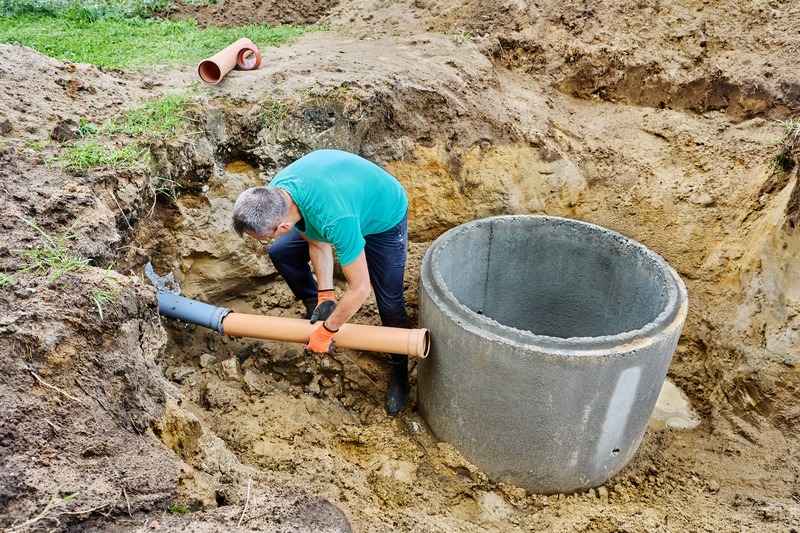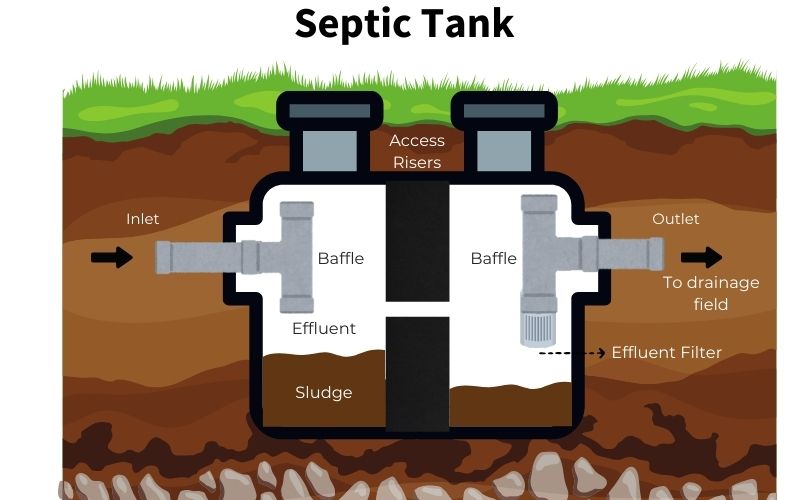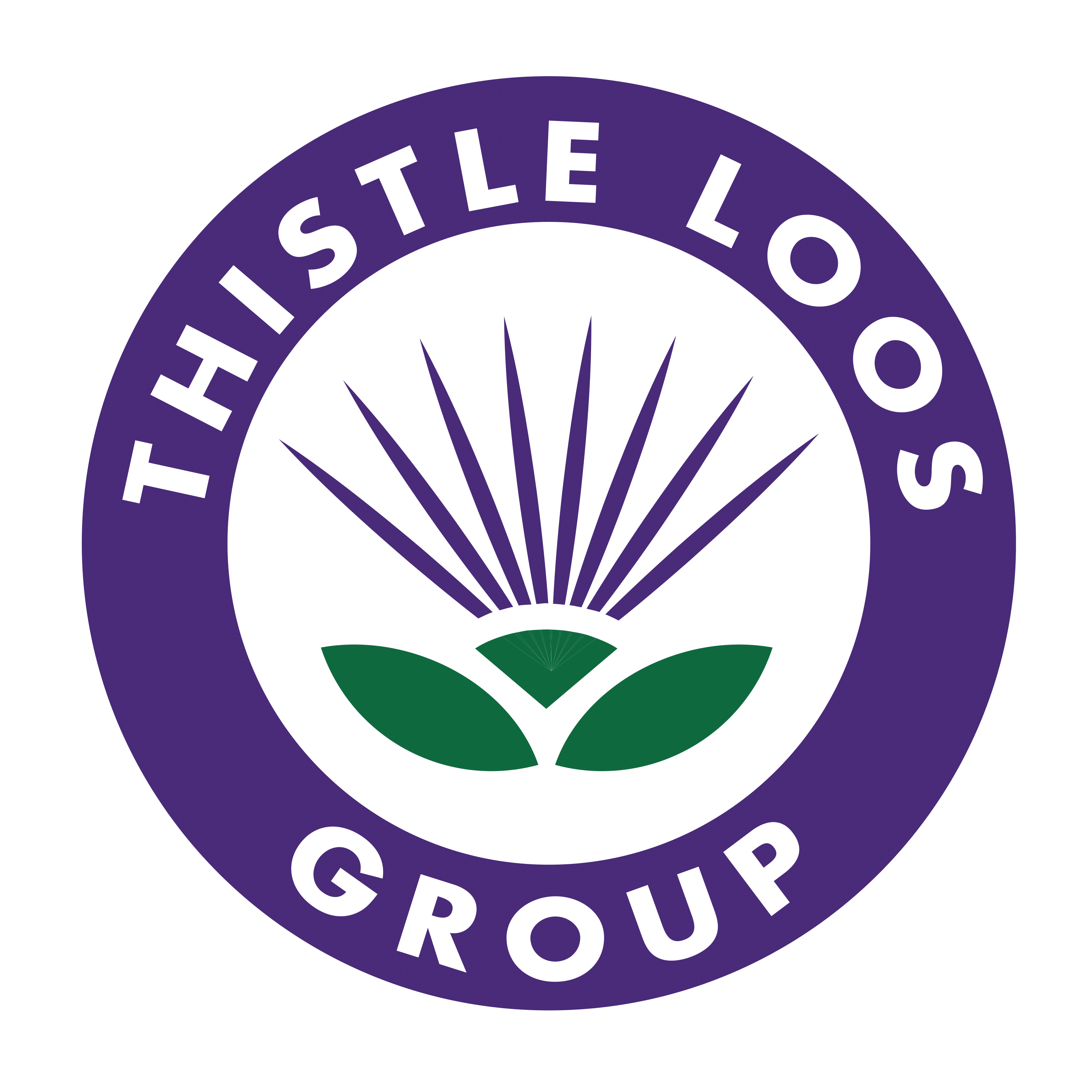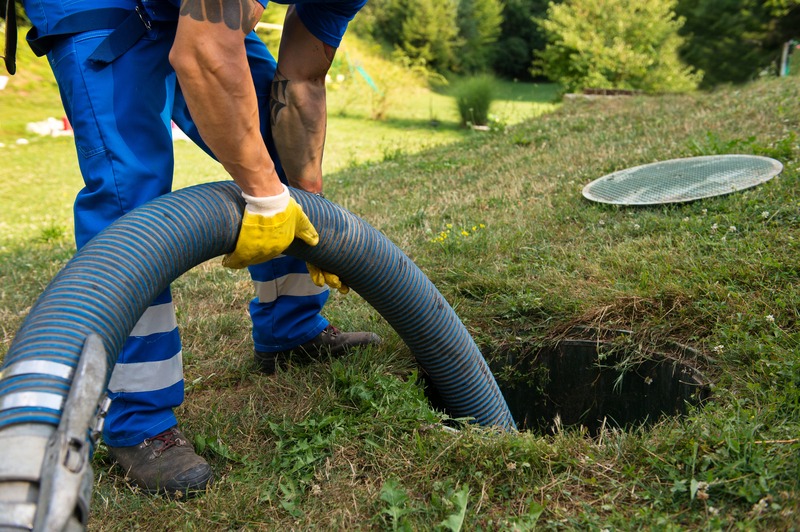Septic tank maintenance is essential for households relying on septic systems to manage their wastewater. These systems are an effective and eco-friendly way to treat sewage in areas not connected to the main sewer network. However, without proper care and maintenance, they can quickly become inefficient and even hazardous.
By maintaining your septic tank, you can extend its lifespan, reduce the risk of system failure, and avoid the costly expenses of major repairs. Moreover, a well-maintained septic tank contributes to the overall health and safety of your home, reducing the risk of sewage backups and foul odours.
Let us explore how septic tanks function and the key components involved before learning the essential tips for keeping your system in top condition.
Understanding Septic Tanks
Knowing the components and how they interact will help you maintain the system effectively, identify potential issues, and make informed decisions regarding your septic tank upkeep.
What is a Septic Tank?
A septic tank is an underground, self-contained system designed to treat wastewater from household activities, such as washing, cooking, and toilet use. Unlike public sewer systems, which rely on a centralised network of pipes, septic tanks treat wastewater on-site, making them ideal for rural or off-grid homes where connecting to the main sewer system is impractical or impossible.

Components of a Septic Tank System
To properly maintain your septic system, it’s crucial to understand the various components that make up the system and their individual functions.

- The Tank: The septic tank is the primary component of the system. Its role is to hold wastewater and allow for the separation of solids (sludge), scum (floating materials), and liquid effluent. Over time, the solids settle to the bottom, while the liquid effluent rises to the top and flows out to the drainage field.
- Drainage Field: Also known as a leach field or leaching bed, the drainage field is where the liquid effluent is dispersed into the ground for further treatment. The effluent is filtered by the soil, which removes harmful pathogens and nutrients before it returns to the groundwater.
- Inlet and Outlet Pipes: The inlet pipe directs wastewater from your home into the septic tank, while the outlet pipe carries the treated liquid effluent out to the drainage field. Both pipes need to remain clear to ensure the smooth flow of wastewater through the system.
- Baffles: Baffles are internal components of the septic tank that help direct the flow of wastewater, separating solids, scum, and liquid effluent. The baffles also prevent the scum from blocking the outlet pipe, which could lead to system backups.
- Effluent Filter: An effluent filter, located at the outlet of the septic tank, helps trap remaining solids in the wastewater before it is sent to the drainage field. This reduces the risk of clogging the drainage field and helps ensure that the treated effluent is clean before being released into the ground.
Why is it Important to Care for Septic Tank Maintenance?
Now that we have a clearer understanding of how septic tank systems function let’s explore some of the key reasons why looking after your septic tank is so important.
Financial Savings
Maintaining your septic tank is an investment that pays off in the long run. Routine inspections and pump-outs prevent blockages and major system failures, which can cost thousands to repair. For example, while regular pump-outs might cost £150–£300 every few years, repairing or replacing a neglected system could run into the thousands.
Environmental Impacts
Improper septic tank maintenance can have serious environmental consequences. When a system fails, untreated waste can seep into the ground, contaminating water sources and harming local ecosystems. Proper septic tank care and maintenance prevent these issues, ensuring sustainable wastewater management.
Health and Safety
A neglected septic tank poses risks to your household’s health. Sewage backups can expose you to harmful bacteria and unpleasant odours. Proper maintenance ensures waste is contained and processed safely, reducing the risk of waterborne illnesses and environmental hazards.
Property Value
For homeowners, maintaining septic systems is a smart move to protect property value. A functioning septic system is a selling point for prospective buyers. Conversely, a neglected system can lead to failed property inspections and a lower valuation. Demonstrating that you’ve prioritised septic tank upkeep reassures buyers and boosts your home’s appeal.
Septic Tank Dos and Don’ts
Caring for your septic system is not only crucial for its efficiency but also for the safety of your property and the environment. Proper septic tank maintenance prevents costly repairs, keeps your home running smoothly, and ensures you’re doing your bit for the planet. Whether you’ve been maintaining a septic tank for years or are new to the process, these expanded dos and don’ts will guide you towards effective septic tank upkeep.
Septic Tank Dos and Best Practices
Properly maintaining your septic tank starts with proactive habits. Following these best practices can significantly extend your system’s lifespan, prevent issues, and save money in the long run.
1. Schedule Regular Pumping
Routine septic tank emptying is essential to keeping your system working efficiently. Over time, solids settle at the bottom of the tank, forming a layer of sludge. If this sludge isn’t removed, it can build up and clog the system, leading to backups or damage to the drainage field.
Hence, Most tanks need pumping every 3–5 years. However, factors like household size, water usage, and tank capacity can affect this schedule. Consult a professional to determine the optimal frequency to pump the septic tank for your home.
2. Conserve Water
Excess water can overload the system, preventing solids and liquids from separating properly. This can lead to untreated waste entering your drainage field, causing contamination and costly repairs.
Install low-flow toilets and water-efficient appliances. Spread out high-water activities, like laundry or dishwashing, to give your system time to process waste effectively. Fix leaks immediately to avoid unnecessary strain on your tank.
3. Flush Responsibly
What you flush can have a big impact on the health of your septic tank. Hence, only flush human waste and septic-safe toilet paper. These materials break down easily, allowing the system to process them effectively.
4. Use Biological Additives
Biological additives replenish the bacteria in your tank, which are crucial for breaking down organic waste. This helps prevent sludge buildup and maintains efficiency. Always seek advice from a professional before choosing additives to ensure they’re safe and effective.
5. Protect the Drainage Field
Your drainage field plays a vital role in dispersing treated wastewater back into the ground. Hence it is crucial to Keep the area clear of vehicles, heavy machinery, and permanent structures to avoid compacting the soil or damaging pipes.
6. Keep Tank Access Clear
Ensure that your tank’s access points are easy to locate and free from obstructions. This makes inspections, maintenance, and emergency repairs much more straightforward. Keep access lids exposed and avoid planting anything that could obscure them.
Septic Tank Don’ts
Knowing what to avoid is just as important as knowing what to do when maintaining septic systems. These common pitfalls can cause unnecessary damage and reduce the efficiency of your system.
1. Avoid Non-Biodegradable Items
One of the quickest ways to disrupt your septic system is by flushing or draining materials that don’t decompose naturally. Wet wipes, sanitary products, dental floss, cotton buds, and nappies. These materials can clog pipes, block outlets, and reduce the efficiency of your tank, leading to costly repairs.
2. Don’t Use Harsh Chemicals
Strong cleaning agents such as bleach, paint thinners, oil-based cleaners, and industrial-strength detergents can destroy the beneficial bacteria essential for breaking down waste.
Instead, use biodegradable or septic-safe products to clean your home. These alternatives maintain the bacterial balance in your tank while keeping your household fresh and sanitised.
3. Keep Food Waste Out
Your septic tank is not designed to handle food scraps or grease. Grease and fats can solidify, clog pipes, and disrupt the waste treatment process. Food waste can overload the system and attract pests. Use a compost bin for kitchen scraps and dispose of oils in sealed containers at designated waste collection sites.
4. Avoid Disposing of Pharmaceuticals
Medicines can disrupt the bacterial balance in your tank and contaminate the environment. Antibiotics and other drugs kill the bacteria necessary for breaking down waste. Improper disposal can also pollute groundwater, impacting local ecosystems. It is advised that you return unused medication to a pharmacy or designated disposal point.
5. Minimise Excess Water Usage
Too much water entering the system can overwhelm your septic tank. Running multiple appliances at once, long showers, and unnecessary water waste. Overloading the system prevents solids from settling and liquids from being properly treated before entering the drainage field.
Regulations and Guidelines for Septic Tank Maintenance
Proper septic tank maintenance is essential for keeping your system running efficiently while protecting the environment. The UK’s General Binding Rules outline key regulations for maintaining septic systems and ensuring wastewater is disposed of responsibly. Below are the main aspects you need to know about septic tank care and maintenance.
Discharge Standards
The General Binding Rules set strict standards for wastewater quality. Properly maintaining your septic tank ensures that discharged water is safe and minimises environmental impact. This is crucial for protecting local water sources and your surrounding drainage field.
Regular Maintenance Obligations
Maintaining a septic tank involves regular inspections, timely emptying, and routine checks to ensure it remains in good working order. Overloading the system can lead to blockages, odours, or even leaks that harm the environment. Staying on top of septic tank upkeep not only prevents these issues but also extends the life of your system.
Responsible Waste Disposal
Certain substances, like oils, chemicals, and non-biodegradable materials, should never enter your septic system. These can cause clogs or contamination, making proper septic tank care and maintenance essential for protecting soil and water quality.
Location and Compliance
The location of your septic tank plays a vital role in its performance. Guidelines ensure tanks are sited appropriately to reduce risks to groundwater and nearby water sources. Compliance with these regulations is mandatory, and failing to adhere could result in penalties.
When to Seek Professional Help?
While maintaining a septic tank is largely a matter of routine upkeep, there are certain situations where seeking professional help is essential to avoid significant damage to your system. Here’s when to call in the experts:
Routine Inspections
Even if your septic tank seems to be working fine, it’s recommended to schedule annual inspections with a professional. Septic tanks are underground, and many issues can go unnoticed until they cause major problems. A professional inspection can identify small issues before they become costly, such as minor leaks, pipe blockages, or early signs of system failure.
Routine checks ensure that your septic system is functioning as it should, extending its lifespan and preventing unexpected disruptions.
Warning Signs
Certain symptoms may indicate that your septic tank is in trouble and needs immediate attention.
- Slow Drains: If your sinks, showers, or toilets are draining slowly, it may be a sign that your septic tank is overloaded or has a blockage.
- Sewage Odours: Foul smells around your property or near the septic tank or drainage field indicate a potential system failure or leak.
- Water Pooling: Standing water or wet patches near your drainage field can signal a blocked or malfunctioning system, preventing proper wastewater dispersion.
Emergency Situations
Septic tank failures can escalate quickly, so it’s crucial to address severe problems as soon as possible. If your tank is leaking, wastewater is backing up into your home, or the system has completely stopped working, immediate professional intervention is required.
Delaying repairs in an emergency situation can result in significant property damage, costly repairs, and even health hazards. Always seek professional help at the first sign of serious trouble.
Septic Tank Maintenance with Thistle Tanks
Maintaining a septic tank is not only essential for ensuring the proper functioning of your system, but also for safeguarding your property, health, and the environment. By following the dos and don’ts, staying compliant with regulations, and knowing when to seek professional help, you can prevent costly repairs, avoid legal trouble, and prolong the lifespan of your septic system.
Thistle Tanks is your trusted partner for septic tank, and cesspit emptying and services. We offer rapid and reliable services to keep your system operating smoothly, from regular pump-outs to efficient emergency interventions.
Our high-quality tanker services also include effluent tank hire and welfare unit emptying, providing a comprehensive solution for your waste management needs. Whether you need routine septic tank care or help with an urgent issue, Thistle Tanks is here to help.
Request a free quote today or call us at 01455 413661 to discuss how we can assist with maintaining your septic tank, ensuring its longevity, and keeping your property safe. Keep your septic system in top condition with Thistle Tanks.

